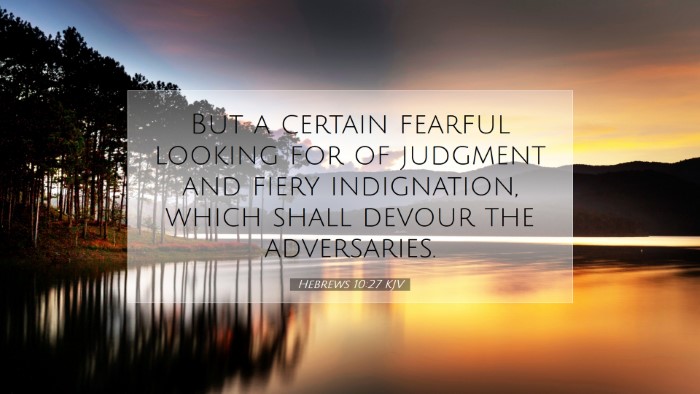Commentary on Hebrews 10:27
Hebrews 10:27 reads: "But a fearful expectation of judgment, and a fury of fire that will consume the adversaries.".
This verse serves as a stern reminder of the consequences of rejecting the grace of God. The author of Hebrews addresses the seriousness of apostasy, emphasizing that turning away from the light of the Gospel leads to severe repercussions.
Contextual Analysis
In the broader context of Hebrews, the author writes to a group of Jewish Christians who are facing persecution and temptation to revert to Judaism. The warnings throughout the epistle underscore a crucial theme: the greater the revelation of Christ, the harsher the consequences of rejecting Him.
The preceding verses (Hebrews 10:26) highlight the deliberate sin of rejecting Christ after having received knowledge of the truth. The author argues that such a choice places individuals in dire straits, prompting the fearsome expectation of judgment.
Theological Implications
This verse raises significant theological themes concerning judgment and the nature of divine justice. The fearful expectation of judgment is not simply an emotional response but a sober recognition of divine holiness. As Albert Barnes notes, this serves to remind believers to remain vigilant and faithful.
- Divine Justice: God's judgment is classified as a 'fury of fire', symbolizing the intense nature of His wrath against sin. Adam Clarke elaborates on this imagery, noting that fire is often associated with purification and judgment.
- Apostasy: Matthew Henry emphasizes the gravity of apostasy. He posits that this warning is particularly significant for those who have witnessed the truth yet choose to walk away, presenting a concept of accountability in faith.
- Adversaries of God: The term 'adversaries' signifies those who actively oppose God's ways. This calls believers to consider their standing with God and the potential consequences of their actions.
Exegetical Insights
Examining the original Greek text reveals rich meanings that deepen our understanding of judgment. The term translated as 'fearful expectation' (φοβερὰ ἐλπίς) conveys a sense of dread tied to anticipation, a critical distinction from the hopeful expectation believers typically possess regarding salvation.
Furthermore, the 'fury of fire' (καὶ ζῆλος πυρός) speaks to the intensity of God's judgment, implying an unquenchable fire that consumes His adversaries. This phrase resonates with themes found in the Old Testament concerning divine judgment, particularly in prophetic literature (e.g., Isaiah 66:24).
Historical Perspectives
Historically, the early Church faced numerous external pressures that prompted discussions around apostasy and the serious consequences thereof. Early church fathers echoed similar warnings, demonstrating the continuity of this teaching throughout church history.
Matthew Henry notes that the fears expressed in this verse serve not only as a theological caution but also as a pastoral guidance, urging believers to remain steadfast in their faith amidst trials.
Applications for Today
For contemporary readers, Hebrews 10:27 serves as a call to reflect on their relationship with God. With cultural pressures and distractions that tempt believers to compromise, this verse reminds the faithful of the seriousness of their commitment to Christ.
- Self-Examination: Believers must engage in self-examination to ensure their faith is genuine and steadfast against the tides of societal norms that contradict Christian teachings.
- Encouragement to Persevere: As pastors and church leaders, reminding congregants of the seriousness of judgment can encourage perseverance in the faith, especially during trials.
- Grace and Mercy: While this verse emphasizes judgment, it should also lead to reflections on the grace found in Christ, who—despite our sins—offers redemption if we turn to Him sincerely.
Conclusion
Hebrews 10:27 presents a sobering picture of the consequences awaiting those who reject the Gospel. It draws attention to the integral relationship between faithfulness and judgment. Through the insights of Matthew Henry, Albert Barnes, and Adam Clarke, we see the depth of this warning and are reminded of the importance of holding fast to our faith.
As we ponder these profound truths, may we all be spurred on to live lives that honor God, aware of both His judgment and the immense grace given to us through Jesus Christ.


